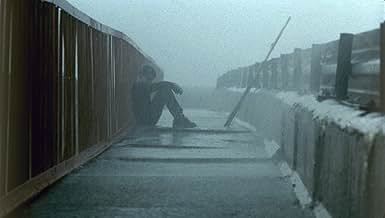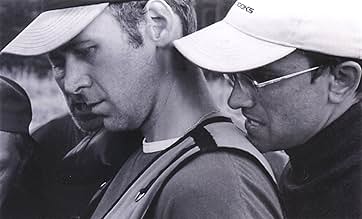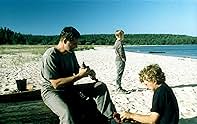CALIFICACIÓN DE IMDb
7.9/10
49 k
TU CALIFICACIÓN
En el desierto ruso, dos hermanos deben lidiar con nuevas y conflictivas emociones cuando su padre, al que solo conocen a través de una sola fotografía, reaparece.En el desierto ruso, dos hermanos deben lidiar con nuevas y conflictivas emociones cuando su padre, al que solo conocen a través de una sola fotografía, reaparece.En el desierto ruso, dos hermanos deben lidiar con nuevas y conflictivas emociones cuando su padre, al que solo conocen a través de una sola fotografía, reaparece.
- Dirección
- Guionistas
- Elenco
- Premios
- 33 premios ganados y 20 nominaciones en total
- Dirección
- Guionistas
- Todo el elenco y el equipo
- Producción, taquilla y más en IMDbPro
Opiniones destacadas
Two pre-teen boys are shocked when their father returns home to them and their mother, after being inexplicably away for 12 years. He takes them on a road trip the next day. If you've seen the incredible but spoiling trailer for this movie, you know what happens in the last 10 minutes. Apart from the frustrating promotional trailer, this movie is exceptional and is one of the most strikingly beautiful films I've seen in a long time. The child actors are so incredible it is almost discomforting. The cinematography is simply breathtaking. "The Return" would make for a perfect double feature with the equally gorgeous and disturbing Italian film "I'm Not Scared" (aka "Io non ho paura"). Both films explore the fear and courage that results when children are suddenly faced with unknown horrors of the adult world. My Rating: 9/10.
Andrei and Ivan have lived the vast majority of their lives with their mother and grandmother. They find this dynamic changed when their father turns up after 12 years absence. While Andrei seems happy with this and keen to try and bond with his father, the younger Ivan is much more stubborn and reluctant being suspicious of this man's motives. The three go on a trip fishing for a few days, which turns into a much longer time as the father has 'business'. As the journey continues Ivan struggles with a father who is strict and strangely cruel.
On the back of awards and good reviews I was interested enough to go and watch this film at the cinema. Not being a great thinker myself, I usually find the 'you work it out' attitude of art-house films to be rather annoying and unfair and sadly there was an element of that with this film. The narrative is interesting enough to keep you in your seat but just don't expect anything to be explained; in fact there was not even enough information to even really interpret what was going on by the end of the film I was left with buckets of questions but hardly a single answer I wanted to ask the others in the cinema (all 4 of us) if they had 'got it' and if it was just me. However what saves this film from being another obscure arty movie is the delivery and the journey we are taken on. For all the unknowns the film is still gripping, even if it is slow at the same time. The journey is an interesting one and one that sees the characters grow in ways I was captivated by even if I didn't understand it all. I would have liked even a little bit of information by the end but I was content that I had witnesses a story and, like some things in life, you don't get all the facts I was just like the boys in the film, not knowing what was going on but involved in it nonetheless.
For a debut feature the direction from Zvyagintsev was excellent. It was full of great shots, great camera movement and wonderful use of surroundings to create a world where only these three are no other cars and barely any other people. For this same reason, praise should be endlessly heaped onto cinematographer Krichman as he makes everything look eerily beautiful and calm. The direction aids the minimal story and helped keep me interested, but the clincher for me were the performances. The only named characters are the two boys and, as such, the best performances come from them. Everyone knows that Garin died in an accident similar to the films opening tower-jumping scene and it casts a bit of a shadow over his performance to think that such a young man has died needlessly, but his performance here is still assured. He is keen but he stills allows us to see bits of doubt and fear in his eyes like a loyal dog coming back after a beating. Dobronravov gives a completely different performance that is much more showy and powerful and he totally surprised me such a strong and believable performance from so young a boy, he makes Hollywood's blockbuster preening child 'actors' appear to be the bland products that many of them are. Lavronenko's 'father' is a brooding beast who is hard to understand and he plays him fairly blankly. In a way this works but I did wonder if Lavronenko really understood his character either. Two or three others are in the film but, as the character names suggest, the film belongs to Krichman and the late Garin and they do not struggle with this responsibility.
Overall I will not claim to fully understand what the story was about or if it was an allegory for wider issues but the story is still engaging and emotional. The delivery is pretty much perfect although I imagine many audiences will be put off by both the lack of information and the slow pace.
The direction and cinematography are superb and the two boys in the lead put many other child actors to shame by the sheer confidence and ability they have in delivering such complex characters and emotions.
On the back of awards and good reviews I was interested enough to go and watch this film at the cinema. Not being a great thinker myself, I usually find the 'you work it out' attitude of art-house films to be rather annoying and unfair and sadly there was an element of that with this film. The narrative is interesting enough to keep you in your seat but just don't expect anything to be explained; in fact there was not even enough information to even really interpret what was going on by the end of the film I was left with buckets of questions but hardly a single answer I wanted to ask the others in the cinema (all 4 of us) if they had 'got it' and if it was just me. However what saves this film from being another obscure arty movie is the delivery and the journey we are taken on. For all the unknowns the film is still gripping, even if it is slow at the same time. The journey is an interesting one and one that sees the characters grow in ways I was captivated by even if I didn't understand it all. I would have liked even a little bit of information by the end but I was content that I had witnesses a story and, like some things in life, you don't get all the facts I was just like the boys in the film, not knowing what was going on but involved in it nonetheless.
For a debut feature the direction from Zvyagintsev was excellent. It was full of great shots, great camera movement and wonderful use of surroundings to create a world where only these three are no other cars and barely any other people. For this same reason, praise should be endlessly heaped onto cinematographer Krichman as he makes everything look eerily beautiful and calm. The direction aids the minimal story and helped keep me interested, but the clincher for me were the performances. The only named characters are the two boys and, as such, the best performances come from them. Everyone knows that Garin died in an accident similar to the films opening tower-jumping scene and it casts a bit of a shadow over his performance to think that such a young man has died needlessly, but his performance here is still assured. He is keen but he stills allows us to see bits of doubt and fear in his eyes like a loyal dog coming back after a beating. Dobronravov gives a completely different performance that is much more showy and powerful and he totally surprised me such a strong and believable performance from so young a boy, he makes Hollywood's blockbuster preening child 'actors' appear to be the bland products that many of them are. Lavronenko's 'father' is a brooding beast who is hard to understand and he plays him fairly blankly. In a way this works but I did wonder if Lavronenko really understood his character either. Two or three others are in the film but, as the character names suggest, the film belongs to Krichman and the late Garin and they do not struggle with this responsibility.
Overall I will not claim to fully understand what the story was about or if it was an allegory for wider issues but the story is still engaging and emotional. The delivery is pretty much perfect although I imagine many audiences will be put off by both the lack of information and the slow pace.
The direction and cinematography are superb and the two boys in the lead put many other child actors to shame by the sheer confidence and ability they have in delivering such complex characters and emotions.
I've seen many emotional films in my life, but I've never seen a film with as much emotional intensity as Vozvrashcheniye. Even though I don't know what it is like to have a distance or missing parent, I feel I've suffered the same feelings that other children in this situation must have.
The emotional content of the film continues if you watch the documentary on the making of the film included in the DVDs extras. This is no ordinary film; the feelings of the director, the cinematographer, the producer, and the personal experiences of each of the actors; words cannot describe the heart every single person put into this film. The insufficiency of words can also be described by the film itself -there isn't a heavy amount of dialogue, and there doesn't need to be (even though for the majority of the film you're screaming at the characters to say something!). To quote from Fyodor Dostoyevsky (a Russian author): "there is immeasurably more left inside than what comes out in words."
This little review doesn't do justice to the film for the same reason. It is for this reason, this insufficiency that words have, why films (like this one) need to be created.
The emotional content of the film continues if you watch the documentary on the making of the film included in the DVDs extras. This is no ordinary film; the feelings of the director, the cinematographer, the producer, and the personal experiences of each of the actors; words cannot describe the heart every single person put into this film. The insufficiency of words can also be described by the film itself -there isn't a heavy amount of dialogue, and there doesn't need to be (even though for the majority of the film you're screaming at the characters to say something!). To quote from Fyodor Dostoyevsky (a Russian author): "there is immeasurably more left inside than what comes out in words."
This little review doesn't do justice to the film for the same reason. It is for this reason, this insufficiency that words have, why films (like this one) need to be created.
I wandered a bit from commenting movies. But I had to return. This movie made me do it. I didn't know anything about it. I only saw one trailer, that did its job perfectly. Everyone said it was incredible. I went and saw it. I found it more than incredible, staggering at least. It start as a pure, simple story and never wanders from its main character or its story not the slightest bit. Its jaw-breaking stripped-to-the-bone structure is a true novelty. Its young actors reveal themselves worthy of a standing ovation. It's difficult to find words to talk about this movie when it conveys such emotion by so few means. It's a fantastic, cold and often unbearable voyage through a deserted horizon, and one of the best movies of the year.
It amazing how many people have written comments about this movie, and surprising how lengthy their reviews are. Huge Hollywood blockbusters don't generate this kind of passion.
I don't know why this movie works so well, but it does. After the opening scenes, I was a bit concerned it might turn out to be a plodding, slow-paced film, but the plot keeps gathering steam and captures your interest. In this sense, it reminds me of Donna Tartt's brilliant book, "A Secret History", whose the plot is difficult to describe in terms that sound interesting or exciting, but believe me, it's a book that keeps you awake at night because you can't bear to put it down and wait another day to find out what happens next.
The movie's genius is in the way it keeps you guessing about the real identity of the father. It this man really their father? Is he planning to help them? Is he sincerely trying to get to know them, or is he a cold-hearted thug who plans on killing them once they are no longer of any use to him? When the movie ends, you can't be absolutely sure.
Just like "All About Eve" (Bette Davis), this movie has a rare sophistication. The characters might feel love and hate towards someone at the same time. In "The Return", the emotional complexity of the father/son relationship grabs your interest, then couples this with the mystery surrounding the father and his intentions.
If you avoid foreign films because you think they are slow and boring (and in truth, many of them in the 1970s and 1980s were boring), this one will pleasantly surprise you. It's certainly not some "action flick", but you won't be bored; you'll be transfixed.
EDIT: February 9, 2008. It has been about three years since I posted this. So far, I have no indication anyone has ever read it, so if you do, please vote whether the review was helpful or not. Thanks.
I don't know why this movie works so well, but it does. After the opening scenes, I was a bit concerned it might turn out to be a plodding, slow-paced film, but the plot keeps gathering steam and captures your interest. In this sense, it reminds me of Donna Tartt's brilliant book, "A Secret History", whose the plot is difficult to describe in terms that sound interesting or exciting, but believe me, it's a book that keeps you awake at night because you can't bear to put it down and wait another day to find out what happens next.
The movie's genius is in the way it keeps you guessing about the real identity of the father. It this man really their father? Is he planning to help them? Is he sincerely trying to get to know them, or is he a cold-hearted thug who plans on killing them once they are no longer of any use to him? When the movie ends, you can't be absolutely sure.
Just like "All About Eve" (Bette Davis), this movie has a rare sophistication. The characters might feel love and hate towards someone at the same time. In "The Return", the emotional complexity of the father/son relationship grabs your interest, then couples this with the mystery surrounding the father and his intentions.
If you avoid foreign films because you think they are slow and boring (and in truth, many of them in the 1970s and 1980s were boring), this one will pleasantly surprise you. It's certainly not some "action flick", but you won't be bored; you'll be transfixed.
EDIT: February 9, 2008. It has been about three years since I posted this. So far, I have no indication anyone has ever read it, so if you do, please vote whether the review was helpful or not. Thanks.
¿Sabías que…?
- TriviaWhen pre-production was starting, director Andrey Zvyagintsev told producer Dmitry Lesnevsky there was no point in making the film if they couldn't find two boys who were "actors of genius." Zvyagintsev had two assistants who helped him look for actors, one in St. Petersburg and one in Moscow, and visited both cities himself. He found Vladimir Garin in St. Petersburg and Ivan Dobronravov in Moscow, picking them from over 600 contenders.
- ErroresWhen Ivan is sitting in the car, the camera pans around the car (before we see him grab the binoculars and begin to use them) - as it pans past the triangular car window you can see the camera reflected in it.
- ConexionesFeatured in Namedni 1961-2003: Nasha Era: Namedni 2003 (2003)
- Bandas sonorasRequiem in re minore K626
by Wolfgang Amadeus Mozart
Selecciones populares
Inicia sesión para calificar y agrega a la lista de videos para obtener recomendaciones personalizadas
- How long is The Return?Con tecnología de Alexa
Detalles
Taquilla
- Total en EE. UU. y Canadá
- USD 504,256
- Fin de semana de estreno en EE. UU. y Canadá
- USD 19,795
- 8 feb 2004
- Total a nivel mundial
- USD 8,482,993
- Tiempo de ejecución
- 1h 50min(110 min)
- Color
- Mezcla de sonido
- Relación de aspecto
- 1.85 : 1
Contribuir a esta página
Sugiere una edición o agrega el contenido que falta






















